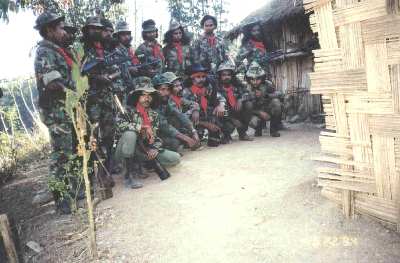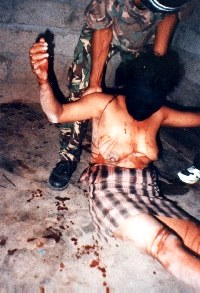Conflicts intensifies in East timor
29 September 1997 - In a new report "Deteriorating Human Rights in Indonesia," Rights Watch/Asia says the conflict in the disputed territory has intensified since a series of guerrilla attacks around the Indonesian parliamentary elections last May. While both sides have violated a cardinal principle of international humanitarian law protecting civilians and non-combatants from hostilities the Indonesian army has been responsible for widespread arbitrary arrest and detention, often accompanied by torture, in its response to the attacks. The report links the recent violence to a build-up of Indonesian paramilitary and counterinsurgency forces in East Timor. Human Rights Watch calls on the international community to request full transparency from the Indonesian armed forces on the number of personnel stationed in East Timor, including rotating battalions, special forces, locally-formed counterinsurgency units, paramilitary groups, police, and intelligence units, and to engage the Indonesian government in discussions on how to reduce that number.
 The report places particular emphasis on the problem of torture and calls
on the Indonesian government to make an announcement, to be published in
the newspaper Suara Timor Timur (Voice of East Timor) and other public
places, that members of the security forces, including police, army, and
various paramilitary groups, are explicitly banned from using any form
of torture, including electric shocks, beatings, and submersion in water,
at all times. The government should cooperate with local human rights organizations
like the Commission on Justice and Peace to set up a mechanism by which
torture victims could report to the commission with confidence that their
accounts would be fully investigated, that they themselves would suffer
no reprisals, and that the torturers would be prosecuted to the fullest
extent of the law. Virtually all branches of the Indonesian army have been
responsible for torture, but allegations center most frequently on Kopassus,
the army special forces, and on the joint military intelligence unit known
in East Timor as SGI.
The report places particular emphasis on the problem of torture and calls
on the Indonesian government to make an announcement, to be published in
the newspaper Suara Timor Timur (Voice of East Timor) and other public
places, that members of the security forces, including police, army, and
various paramilitary groups, are explicitly banned from using any form
of torture, including electric shocks, beatings, and submersion in water,
at all times. The government should cooperate with local human rights organizations
like the Commission on Justice and Peace to set up a mechanism by which
torture victims could report to the commission with confidence that their
accounts would be fully investigated, that they themselves would suffer
no reprisals, and that the torturers would be prosecuted to the fullest
extent of the law. Virtually all branches of the Indonesian army have been
responsible for torture, but allegations center most frequently on Kopassus,
the army special forces, and on the joint military intelligence unit known
in East Timor as SGI.
The report notes that the Indonesian government has learned that torture can be politically costly in case of internationally-known activists or those likely to be the subject of diplomatic inquiries, but there is almost no cost associated with torturing villagers who are only briefly in detention.
Human Rights Watch also calls on members of the armed opposition to cease the practice of executing unarmed civilians suspected of being collaborators and informers. Such executions are in violation of international humanitarian law.
 The report notes that the violence followed a period of growing social
and political tension in East Timor. Some of this was caused by the proliferation
of Indonesian paramilitary groups and counterinsurgency forces beginning
in mid-1995, many of them composed largely of East Timorese who were given
rudimentary training before being equipped with firearms. A pro-integration
youth militia, known by the Indonesian acronym of Gardapaksi, had also
become a major problem. Created in 1995, ostensibly to provide vocational
training for East Timorese youth, Gardapaksi members quickly became partners
of the Indonesian army special forces in military operations.
The report notes that the violence followed a period of growing social
and political tension in East Timor. Some of this was caused by the proliferation
of Indonesian paramilitary groups and counterinsurgency forces beginning
in mid-1995, many of them composed largely of East Timorese who were given
rudimentary training before being equipped with firearms. A pro-integration
youth militia, known by the Indonesian acronym of Gardapaksi, had also
become a major problem. Created in 1995, ostensibly to provide vocational
training for East Timorese youth, Gardapaksi members quickly became partners
of the Indonesian army special forces in military operations.
Tension has also increased with the influx of Indonesians to East Timor, both through official transmigration programs as well as "spontaneous" migration. (The Indonesian transmigration minister made a point of campaigning for the ruling party, GOLKAR, in transmigration sites in East Timor.)
Yet another source of tension is related to the economic development plans for East Timor. These plans include a huge project for cultivating sugarcane, taking up 25,000 hectares of the most fertile land along the southern coast of the territory, which is about to get underway. The main investor is President Soeharto's son, Tommy Soeharto.
The political implications of tensions caused by a heavy
military presence combined with extensive in-migration were highlighted
as early as 1990, the report notes, but the problems remain unaddressed
by the Indonesian government.